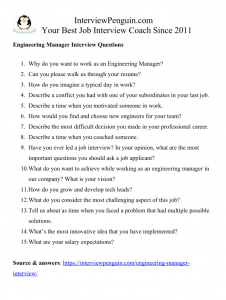You’ve been through a lot in your engineering career, you had your share of successes and failures. This certainly isn’t your first job interview, and perhaps you haven’t had one for years. So let me tell you some good news: your experience is the most important thing for the hiring managers.
The things you achieved as an engineer, the projects you led, and lessons you learned along the way. Of course, you need also leadership and managerial skills to succeed in this position, and that’s why they will ask you some behavioral or situational questions, referring to various situations you may experience in your new role.
Let’s have a look at the questions you may face, and what you should focus on while answering each one.
Table of Contents
Why do you want to work as an Engineering Manager?
Just do not say that you deserve the role (after everything you’ve done for the company, if you apply internally), or that you finally want to earn a six figure annual salary. Obviously both of these are true–you deserve the job, and everyone would love to earn more than $100K in a year. But it’s just not good to refer to these things when you explain why you decided to apply for the job.
What you can refer to, however, is a career change, or at least a slight transition from engineering to management. You’ve had your share of solving all sorts of technical problems, you designed and optimized countless processes, and you learned what it means to lead a project from scratch to completion.
Now, after all the years focusing on engineering work, you’d like to work more with people, lead and oversee the projects instead of taking care of technical aspects of the work. You believe that you have what it takes to manage and lead, and feel excited about the opportunity…
Can you please walk us through your resume?
In many interview this is an icebreaker question. In the interview for Engineering Manager position, it’s the most important question. I suggest you to prepare a visual portfolio of your best works. That means projects you led, or innovations you designed and implemented as an engineer.
To see something once is better than to hear about it a thousand times. That’s why if you can showcase the fruits of your work, and explain your role in each project–the value you brought onboard with your ideas and work, it will make a much stronger impression on the hiring managers.
Just remember to mention some tangible goals you achieved in your former roles, because that’s the most important thing, that’s what they expect from you–to deliver results. Portfolio can really make things easier for you in this case, and since it’s the most important question, you should make a portfolio. At least that’s my suggestion…
How do you imagine a typical day in work?
The most important thing is to show realistic expectations. Many engineers and project managers love the technical part of the job so much, that they talk mostly about it at this point. That’s a big mistake.
As an engineering manager, you will do exactly what the job title suggests–managing engineers. That means hiring new staff or assigning existing staff to projects, training the people, overseeing their work, intervening when necessary, for example when they struggle to move forward.
You may also respond for budgeting and some money stuff, but more than anything else, you will work with people, engineers. Try to center your answer around people you’d manage.
What’s more, you should show proactive approach to work. Ensure the interviewers that you plan to spend a lot of time in the workplace, observing the work of the engineers, and having regular one on one with your people, to ensure that they progress in the right direction, and have the resources they need in their work.
You won’t simply wait in your comfy office until someone calls you and asks for help. You’ll be out there, talking to people, trying to identify issues before they grow into something bigger.
* May also interest you: Tell us about a time when you improved a process – 7 sample answers.
Describe a conflict you had with one of your subordinates in your last job.
Try to pick a constructive conflict. That means a constructive discussion you had with another manager or engineer. Perhaps you didn’t agree about some points, or the way the work was done, or you suggested some improvement they opposed. Now, the most important thing is to:
- Show the interviewers that you are receptive to feedback from your subordinates, that you do not want to lead them with “an iron fist”, never listening to their criticism.
- Admit that you can make a mistake, and you never cease to learn, even from your subordinates. This attitude helps you to stay on the top of your game.
- Ensure the interviewers that you won’t lead pointless personal conflicts in the workplace, destructive conflicts that aren’t good for anything or anyone.
Describe the conflict, and show how it eventually helped you to do your job better, or how it helped to eventually discuss things and ease the tension between you and the other conflict party.
Describe a time when you motivated someone in work.
You will for sure get at least one question that refers to motivation. It can be this one, it can be another variation, but in any case, it will come. Now, you shouldn’t refer to offering people a raise, or threatening them with punishment, or termination of their contract, if they do not deliver.
Such incentives never work in a long run, and in the current situation on the employment market, you simply cannot afford to fire a good engineer, just because they struggle with motivation. Because you may not find another one easily…
Focus on some creative ways of motivating people. For example, what works with engineers (at least in my experience) is keeping them intellectually challenged. Someone struggled with motivation and found their job boring. You assigned them to another team, or presented some challenges that were hard to crack. You gave them tasks that allowed them to unleash their creativity, and to showcase their skills. This helped them to regain motivation.
Another idea is strengthening the team spirit, or improving the overall atmosphere in the workplace. Leading by example will also work in many cases. Your engineers struggled with motivation, but when they saw your passion, your dedication and commitment, they also started to enjoy their job more.
* May also interest you: How do you motivate others? 7 sample answers.
How would you find and choose new engineers for your team?
That’s a million dollar question, especially if you won’t work at Google or Amazon. Engineers are in high demand, and it’s tough to get some great people onboard, especially when you do not have a budget to compete with the big boys.
Again, you should try to show some creativity, and can actually talk about the following things:
- Working with your existing network of connections. You’ve been in the field for long, you know many people, and you believe that your leadership, or a great experience they have with you, may help you attract them to join the company.
- Talent acquisition. Surely, everyone wants experienced engineers, but you believe in your training skills, and once you find a raw diamond, a motivated intelligent engineer–who may lack experience, you will work with them, and turn them into a great asset for the company.
- Laser-targeting and headhunting. Instead of advertising general job descriptions (that tell nothing to the job seekers), you’ll describe specific projects and tasks they will work on. What’s more, you will contact the right engineers directly (for example with the help of LinkedIn), engineers whose experience and skills match perfectly the offer, people who may find the given offer interesting. This course of action will help you stand out with your job offers.
* Special Tip: Download all questions in a one page long PDF, and practice your interview answers anytime later:

Describe the most difficult decision you made in your professional career.
Try to talk about a decision that relates to managing people. Perhaps you had to fire someone, or let someone go, though you knew they were valuable for the company, but you just cannot afford them onboard, or they made some mistake that could not be tolerated.
Another option is referring to your own career. Maybe you had to leave the job you loved, and were earning a lot of money in. You even applied for a job that paid less, just because you didn’t feel intellectually challenged in your former role, you were not progressing as an engineer or leader any longer.
In any case, leaders–and engineering manager is a leader, should be ready to make both difficult and unpopular decisions. Ensure the hiring managers that you won’t let your emotions to impact your decisions. You will always do the right thing for a company, from a long term perspective.
Other questions you may face in your Engineering Manager interview
- Describe a time when you coached someone.
- Have you ever led a job interview? In your opinion, what are the most important questions you should ask a job applicant?
- What do you want to achieve while working as an engineering manager in our company? What is your vision?
- How do you grow and develop tech leads?
- What do you consider the most challenging aspect of this job?
- Tell us about as time when you faced a problem that had multiple possible solutions.
- What’s the most innovative idea that you have implemented?
- What are your salary expectations?
- Have you ever worked on a project that was a failure?
- Tell me about the biggest risk you have taken.
- Tell us about a time when you faced overwhelmed with work.
Conclusion, premium answers to all questions
Interview for a job of an Engineering Manager belongs to difficult job interviews. You will face tricky behavioral questions, and you will also have to demonstrate your experience in the field, and right attitude to work.
Prepare the portfolio of your best works, innovations and projects you led. And learn as much as you can about the job, and the people who will lead your interview.
Try to prepare an answer (situation) to each question from my list, one that demonstrates the right attitude to work, your colleagues, and life in general. And if you do not know how to do that, have a look at our Interview Success Package. Up to 7 premium answers to 31 most common behavioral interview questions (+ more) will help you get ready for each challenge you may face in this tricky interview, outclass your competitors, and get the job.
Thank you for checking it out, and I wish you good luck!
Matthew
May also interest you:


